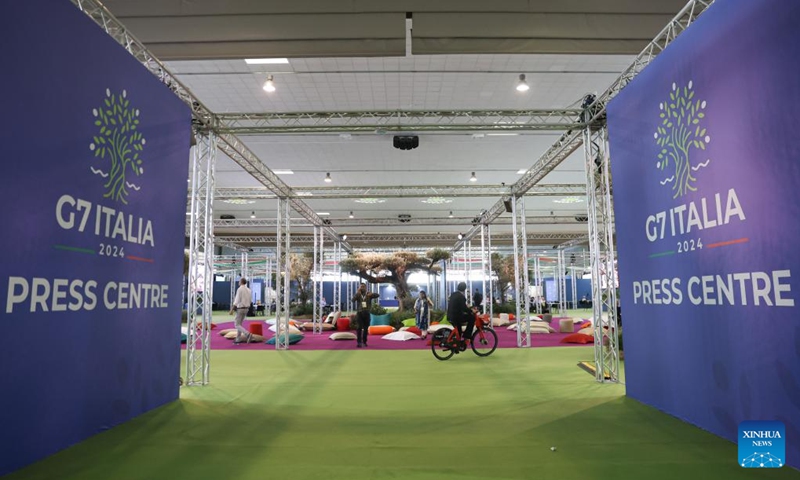
This photo taken on June 12, 2024 shows a view of the media center of the Group of Seven (G7) summit in Bari, Apulia Region, Italy. The G7 summit is to be held in the southern Apulia region on June 13-15. Photo: Xinhua
The Group of Seven (G7) trade ministers met in Italy on Tuesday and Wednesday, with China-related topics - including concerns about so-called overcapacity in China's new-energy vehicle (NEV) sector - once again in focus. UK Trade Secretary Jonathan Reynolds indicated that the UK is not currently planning to impose strict tariffs on Chinese EV imports, but will remain "vigilant," according to a media report.
Speaking at the meeting, Reynolds said he had discussed with European colleagues the EU decision to impose tariffs on Chinese EVs, the Financial Times reported.
The new Labour minister indicated to colleagues that, while he was concerned, he was not planning imminently to launch a formal investigation into Chinese EV imports, according to the report.
The UK is unlikely to follow the EU's lead in imposing extra tariffs on Chinese EV imports, as it has a more open approach to free trade, Cui Hongjian, a professor with the Academy of Regional and Global Governance at Beijing Foreign Studies University, told the Global Times on Wednesday.
"The UK has a tradition of being more open to free trade compared with some countries on the European continent. Additionally, the UK has been a leader in the field of EVs and the green transition, so it may not face the same competitive pressures as the EU," Cui said.
For the UK, there is an opportunity to improve relations with China with the new government taking office. There are many areas where the UK and China can cooperate, particularly in upholding free trade and open economies, Cui added.
If the UK were to adopt extra tariffs following the EU, it would harm bilateral trade, Zhang Xiang, secretary general of the International Intelligent Vehicle Engineering Association, told the Global Times on Wednesday.
According to Zhang, about 6 percent of British cars are exported to China, including luxury brands such as Rolls-Royce, Jaguar and Land Rover.
Experts said that the G7's emphasis on China's "overcapacity" highlights the group's tendency toward trade protectionism.
Some topics at the meeting probably include the issue of so-called overcapacity in Chinese industries, the use of economic pressure through restrictions on imports and exports, and discussions on creating supply chains that are not reliant on specific countries or regions, NHK reported.
"In recent years, the G7 has increasingly become a platform for the US to unify Western countries, especially to serve its strategic needs. By hyping so-called overcapacity, the US is trying to defend its protectionist policies, but it cannot hide the true divisions and contradictions within the G7," Cui said.
The G7 Leaders' Communiqué in June again hyped China-related issues, trumpeting the so-called Chinese overcapacity.
In response, Chinese Foreign Ministry spokesperson Lin Jian said that the G7's "Chinese overcapacity" allegation is unsupported by facts or the laws of the economy. It is just an excuse for protectionism and undermines the global effort for a green and low-carbon transition and cooperation on climate response.
The G7 is the one truly responsible for "economic coercion" as it continues to politicize and weaponize trade, which is a reversal of our globalized world where countries' interests are already deeply integrated. Such behaviors will eventually backfire on the G7 itself, Lin said.




